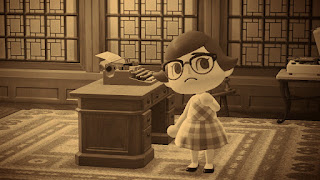Over the years I've noticed that many students and researchers come to my blog looking for specific answers, so here are some of the most common questions people ask me (or ask in general about Video Games as Literature), and links to more info if necessary:
- Q: I am a teacher and would like to share one of your posts with my class. Do I have your permission to do so?
A: Yes, as long as you also share the citation information, including the web address for the blog. This blog exists for educational purposes so I would love for it to reach students! I'd also appreciate if you would let me know you are using it for your class, but this is not a requirement. - Q: Are video games literature?
A: Yes. According to the American Library Association's Gaming Roundtable, "Board games, card games, and videogames are stories & information, presented in new formats. Libraries are about stories & information, not books." Literature, as defined by Merriam-Webster, is, "Writings having excellence of form or expression and expressing ideas of permanent or universal interest" -- just like movie screenplays and other forms of contemporary literature, video games are written and express ideas like any other media.
- Q: What video games are based on books?
A: There are many great lists that have been compiled on the internet of video games that were based on previously existing books. Here are a few links: Goodreads List, Wikipedia.
- Q: How do video games tell stories?
A: Really, video games tell stories in much the same way that books and movies do, with some differences. In many games, the story is linear (think Final Fantasy VII, where the player has little impact on the story itself), but some games allow you to shape the story to your own preferences -- games like Dragon Age: Origins pride themselves on their ability to give players dozens of different story experiences. The writing of the stories in video games is done very similarly to the writing of books, films, or television, though video games usually encompass much longer stories and therefore may incorporate more plot points or acts than are usually included in books and movies. Here is a book that explains in more detail the process of storytelling in video game design.
- Q: Do I have permission to cite your blog in my paper or book?
A: Yes! Please make sure you are following the rules and guidelines of your style guide of choice (MLA, APA, etc.). I am not giving you permission to plagiarize -- only to quote and cite my material within legal parameters.
- Q: Where can I find sources to cite in my paper about video games as literature?
A: I have a regularly updated bibliography of sources on video games as literature HERE, and your school's reference librarian is always willing to help find even more sources I may have missed. Librarians are awesome and usually don't bite!
I will add to this list as more questions are asked of me and as I think of questions.










No comments